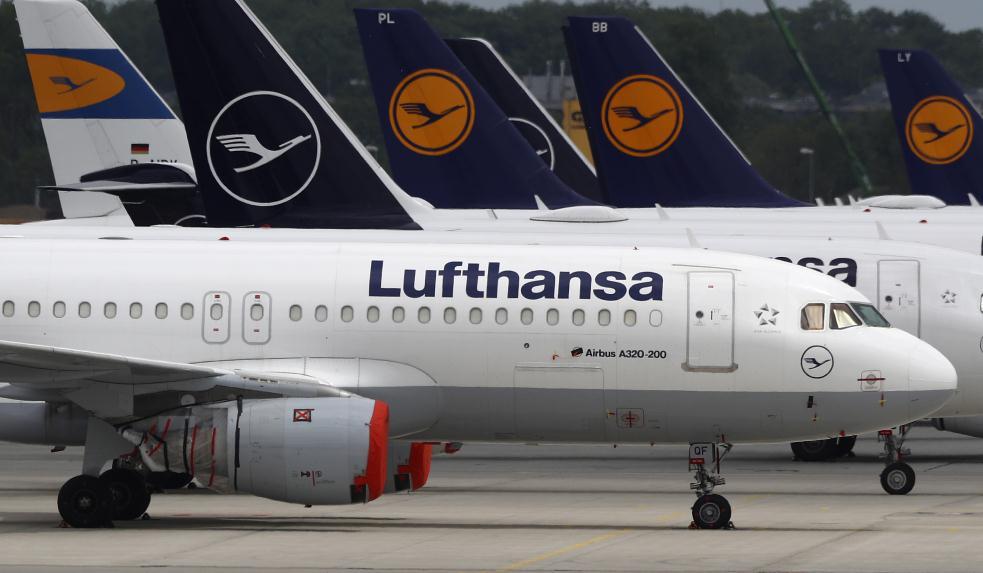The inflation "explodes", the salary is not good, and the pilot strikes collectively!The largest airline in this country announced that 800 flights were canceled
Author:Daily Economic News Time:2022.09.01
According to the Voice of Germany and Germany of CCTV News, on September 1, local time, German's largest airline Hansha Airlines announced that due to pilot strike, the company canceled 800 flights on September 2.
It is understood that due to continuous wage disputes, the pilots of Hansha Airlines will hold a strike on September 2, and the airline has to cancel the "almost all" flight on the day.
According to CCTV News, in the early morning of September 1, local time, the German Hansha Airlines Flying Employees announced that they would continue to strike all day on September 2. It is reported that this will cause all aviation passenger and freight classes from Germany to be affected.
A spokesman for the union revealed that after densely negotiated with the company, the Board of Directors of the Trade Union shall make a strike decision on the request of the collective negotiation committee, because the new collective salary agreement negotiation failed, and recently including exploratory closed -door talks, improvement A series of efforts, including wages proposal and negotiation attempts, have endless results. Hansha Airlines Flying Employees will ask for a 5.5%salary of 5.5%this year and automatically perform inflation compensation next year.

Image source: Visual China VCG111398936880
At the same time, the Flying Employees also prepared to launch a strike at the largest subsidiary of Hansha, the largest subsidiary of Hansha, who had about 100 planes. According to the results of the voting statistics on August 31, 97.9%of them voted to support labor disputes.
However, given a new round of negotiations next week, the trade union does not set a specific date for European wing airline strikes.
Facing the risk of bankruptcy, Hansha Airlines fired a large number of employees
According to CCTV News, on July 13, local time, Hansha Airlines announced that due to insufficient manpower, the company will cancel 2,000 flights again, including German flights and international flights.
A spokesman for the company said that by the end of August, the company's Frankfurt and Munich Airport Hub will cancel a total of 2,000 flights, which is the third batch of flights that the company canceled this year. Earlier, Hansha Airlines has announced that it will cancel 3,000 flights from July to August. On July 7, the company announced that it would cancel 770 flights from July 14.
The main reason why Hansha Aviation cancels the flight on a large scale is that there is insufficient manpower. During the epidemic, due to the risk of bankruptcy, the company fired a large number of employees, including 300 pilots, which led to unprecedented reduction in the number of employment in the aviation industry. According to the latest data from the German Federal Bureau of Statistics, the number of aviation passenger employment in April fell to the lowest level since 2015, a decrease of 6.6%from a year ago. Compared with April 2019, it was reduced by 11.3%. At the same time, the number of passengers is significantly increased. The number of passengers in April increased by 359%compared with the same period last year.
According to CCTV News, on July 27, local time, due to salary disputes, the land service personnel of Germany Hansha Airlines held a one -day strike event, which led to more than 1,000 flights to be canceled. journey.
It is reported that due to the new crown epidemic, Hansha Airlines fired a large number of staff during the epidemic to avoid the company's bankruptcy. After the aviation and tourism industry gradually recovered, the company has been facing a situation of shortage of personnel. The existing local personnel have undergone tremendous work pressure, and the trade union has blamed this on the airport and airlines' poor management.
In August, the inflation rate in Germany rose again, and oil prices rose sharply
According to Xinhua Finance August 30, Germany's inflation rate in August rose again, slightly exceeding the median market expectations. In the early morning of European transactions, when the price of natural gas in Europe fell sharply, the euro recovered to the US dollar to the parity level again. German inflation data did not provide further support for the euro.
The preliminary valuation of the German Federal Bureau of Statistics showed that the German consumer price index (CPI) rose 7.9%year -on -year, slightly higher than the medium value (7.8%) of the forecast of economists in the previous market survey. The inflation rate of EU statistics (HICP) was 8.8%, which was higher than the level of last month, but met expectations.

Image source: Photo Network ID: 500829026
The level of inflation in Germany has risen to the level before the implementation of the above measures, the high point since the early 1970s. In addition to energy, food once again became a price -driven factor.
Analysts of the Dutch International Bank Group said that the rise in German inflation will exacerbate the European Central Bank's internal debate on the next move. Even if the economic recession is imminent, the European Central Bank is currently willing to raise interest rates further. The market is expected to raise interest rates by the central bank next week.
According to CCTV News, on September 1, local time, after the German government launched a three -month fuel subsidy measure, German oil prices rose sharply.
According to statistics from more than 400 gas stations such as Hamburg, Munich, and Berlin, the German Automobile Transportation Association shows that on the morning of the 1st, the average price of diesel has far exceeded 2.10 euros per liter. Euro; the average price of high -quality gasoline has also exceeded 2 euros per liter.
The German Automobile Transportation Association said that in a mathematical sense, due to the expiration of fuel subsidy measures, the price of diesel will increase at least 17 euros per liter, and the price of gasoline will increase at least 35 euros per liter.However, because most suppliers will choose to buy more fuels as possible before the subsidy expires, the price increase caused by subsidies may take a period of time to fully reflect, which also means that German oil prices will continue to rise sharply in the future.Earlier, the German government has implemented fuel subsidy policies since June 1 this year, and has canceled fuel additional taxes from June to August.
Daily Economic News Comprehensive CCTV News, Xinhua Finance
Daily Economic News
- END -
The American Women's Basketball Team was smuggled to Russia to establish a Russian court for 9 years and fined a fine

Data map: Britney Grina in the first round of the 2016 Rio Olympic Women's Basketb...
CNN: Canadian company launches pure electric vacuum tube train plans to run 1,000 kilometers per hour cost $ 18 billion

China Well -off. September 2nd. The Laoma's Canadian company announced a plan for ...